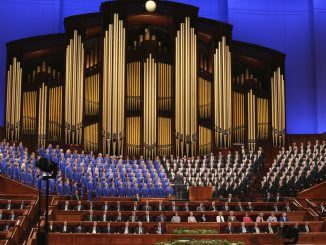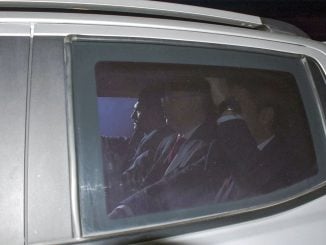While the Supreme Court is used to seeing Catholics, who make up six of the nine current justices, the Oval Office has just its second Catholic in President Joe Biden. Catholics, including here in North Carolina, are conflicted about whether to celebrate how far they’ve come in a nation that used to shut them out of the halls of power, or to fight an aggressively progressive president who is already clashing with U.S. bishops over issues like abortion, sexuality and religious freedom.
From all outside appearances, Biden’s inauguration was one from a deeply Catholic president. The night before his inauguration, he attended a ritual of remembrance for those who have died in the pandemic, with an opening prayer by Washington, D.C., Cardinal Wilton Gregory. The next morning, he attended mass at the Cathedral of St. Matthew the Apostle before his swearing-in. Even during his inaugural speech, he highlighted his Catholic background, saying, “Many centuries ago, St. Augustine, a saint in my church, wrote that a people was a multitude defined by the common objects of their love.”
But the reality of Biden’s relationship with and to the Catholic Church is more complicated. That tension was made immediately clear when his inauguration was met with several press releases, some highly critical, from the United States Conference of Catholic Bishops (USCCB), the Catholic Church’s leadership in the country.
After Biden lifted the Mexico City Policy, which prohibits federal funding from being spent to support abortion overseas, a USCCB statement said, “It is grievous that one of President Biden’s first official acts actively promotes the destruction of human lives in developing nations.”
An even harsher rebuke was given by Archbishop José H. Gomez of Los Angeles, who serves as president of the USCCB. Gomez started on a friendlier note, saying they work with all administrations, and “Working with President Biden will be unique, however, as he is our first president in 60 years to profess the Catholic faith.”
The archbishop continued, though, by saying, while the USCCB appreciates the impact Biden’s Catholic faith has had on his life, “At the same time, as pastors, the nation’s bishops are given the duty of proclaiming the Gospel in all its truth and power, in season and out of season, even when that teaching is inconvenient or when the Gospel’s truths run contrary to the directions of the wider society and culture. So, I must point out that our new President has pledged to pursue certain policies that would advance moral evils and threaten human life and dignity, most seriously in the areas of abortion, contraception, marriage, and gender. Of deep concern is the liberty of the Church and the freedom of believers to live according to their consciences.”
Gomez continued, saying that “For the nation’s bishops, the continued injustice of abortion remains the ‘preeminent priority,’” and that despite some areas of agreement, as “Pope Francis teaches, we cannot stay silent when nearly a million unborn lives are being cast aside in our country year after year through abortion.”
Patricia Guilfoyle, a spokesperson for the Diocese of Charlotte, told NSJ that the bishops had given a number of positive press releases on areas they are planning to work with Biden, but “they have consistently decried the administration’s direct attacks on anti-abortion regulations related to Title X funding, the Mexico City policy, and the Hyde Amendment, and when President Biden cheered the anniversary of the Roe v. Wade decision Jan. 22.”
In a Feb. 13, 2021, interview with Catholic World Report, Archbishop of Kansas City, Kansas, Joseph F. Naumann said at this point, “The president should stop defining himself as a devout Catholic” because of his view on abortion.
On abortion, the Catholic Catechism states, “Since the first century, the Church has affirmed the moral evil of every procured abortion. This teaching has not changed and remains unchangeable.” It then quotes the earliest known church document outside the New Testament, the Didache, written in the first century, which states, “You shall not kill the embryo by abortion and shall not cause the newborn to perish.”
Those who disagree with the church on this or other higher-level doctrinal matters are under a latae sententiae excommunication, a self-imposed separation, and cannot present themselves for communion until they give up this belief and go to confession. This is generally seen as a private issue between God and the individual, so priests are directed not to police which people coming to mass should be taking communion. An exception to this, though, noted in Canon 915 of Canon Law, is if a public figure, like a politician, stands against church teaching on a major issue and then presents themselves for communion.
In 2013, Pope Francis affirmed a 2007 statement on the topic, which said, “[t]hey cannot receive Holy Communion and at the same time act with deeds or words against the commandments, particularly when abortion, euthanasia, and other grave crimes against life and family are encouraged. This responsibility weighs particularly over legislators, heads of governments, and health professionals.”
This isn’t always enforced, but Fr. Robert Morey, a priest in the Diocese of Charleston, South Carolina, followed through in 2019 and denied Biden communion when he visited Saint Anthony Catholic Church. He told the Florence Morning News, “Any public figure who advocates for abortion places himself or herself outside of Church teaching.”
In an interview with PBS right after the incident, Biden said, “That’s a private matter; I’m not going to talk about that.”
During the 2008 presidential campaign, the bishop of Biden’s native Scranton, Pennsylvania, Joseph Francis Martino, directed his priests that if Biden were to enter any of the churches in the diocese while he was touring the area, he was not to be given communion.
Other bishops are wary of “politicizing” the eucharist though, like the New York Archdiocese’s bishop, Cardinal Timothy Dolan. When New York Gov. Andrew Cuomo signed a controversial abortion measure, legalizing terminations up to, and in some cases, beyond the moment of birth, he told Fox News that he got “wheelbarrows of letters every day” pressuring him to direct his priests to deny Cuomo communion. Dolan said, though, he thinks it would be “counterproductive” to do so because Cuomo would “represent himself as a kind of martyr to the cause.”
Among Catholics as voters, Joe Biden actually held a 12-point lead, according to an EWTN poll. But Catholics who attend mass frequently were much more conservative — supporting Trump by a 24-point margin — than those who do not attend mass at all, who supported Biden 69% to 25%.
When the first Catholic president, John F. Kennedy, was running in 1959, a Gallup poll found that 25% of Americans said they would not vote for a Catholic, forcing him to make a public address. In 2020, Gallup ran the same poll and found only 4% would not vote for a Catholic, while other groups, like Muslims at 32% and atheists at 38%, fared worse.



